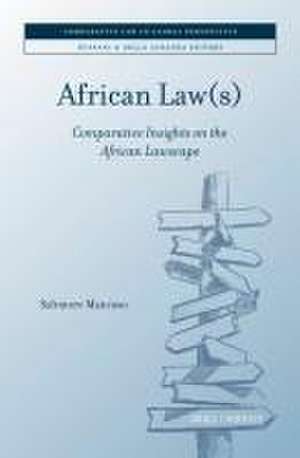African Law(s): Comparative Insights on the African Lawscape: Comparative Law in Global Perspective, cartea 6
Autor Salvatore Mancusoen Limba Engleză Hardback – 4 oct 2023
Preț: 808.16 lei
Preț vechi: 985.57 lei
-18% Nou
Puncte Express: 1212
Preț estimativ în valută:
154.64€ • 161.89$ • 127.96£
154.64€ • 161.89$ • 127.96£
Carte indisponibilă temporar
Doresc să fiu notificat când acest titlu va fi disponibil:
Se trimite...
Preluare comenzi: 021 569.72.76
Specificații
ISBN-13: 9789004685468
ISBN-10: 9004685464
Dimensiuni: 155 x 235 mm
Greutate: 0 kg
Editura: Brill
Colecția Brill | Nijhoff
Seria Comparative Law in Global Perspective
ISBN-10: 9004685464
Dimensiuni: 155 x 235 mm
Greutate: 0 kg
Editura: Brill
Colecția Brill | Nijhoff
Seria Comparative Law in Global Perspective
Notă biografică
Salvatore Mancuso, Ph.D. (2003), is Professor of Comparative Law and Legal Anthropology at the University of Palermo, Italy. He has published monographs and many articles on African and comparative law. He is also Honorary Professor of African law at Xiangtan University, China and Visiting Professor at Somali National University, Somalia.
Cuprins
Foreword
Preface and Acknowledgments
List of Figure
Table of Cases
1Africa and Comparative Law
1 Introductory Remarks
1.1Starting from the Beginning: What Is Law?
1.2Then, What Is African Law?
1.3The Geographic Boundaries
2 African Law in (and Out of) Comparative Law Literature
2.1African Law and Comparative Law Studies
2.2African Law as an Autonomous Legal Family/Tradition?
3 Comparing in Africa
3.1Legal Transplants and the African Context
3.2Language and Law in Africa
3.3Comparing in the African Context
2Methodological Aspects
1 Preliminary Considerations
2 The Contextual Approach
3 The Components of the African Legal Context
3.1 The Informal Normative Orders (or Droits Originellement Africains)
3.1.1 Why Informal and Not Customary?
3.1.2 Characteristics of African Informal Law(s)
3.1.3 The Distinction between Official and Living “Customary” Law: a Non-sense
3.1.4 Informal Law(s) after Colonization
3.2Religious Laws
3.2.1 The African Vision on Religion
3.2.2 Islamic Law
3.2.3 The Law Inherent to the Christian Religion
3.2.4 Jewish Law
3.2.5 Hindu Law
3.3The Import of the European Pattern
3.3.1 The Process of Colonization
3.3.2 The Political and Legal Administration of the Colonies
3.3.3 The Impact of Western Laws on African Traditional Laws
3.4Post-Independence Law
3.5Law in Africa Further to the Structural Adjustments
3.6Urban Informal Law(s)
3.7Law in Africa in the 21st Century
3.8A First Verification of the Method: the Present African Lawscape
3Characteristic Features of Law in Africa
1 Approaching Legal Pluralism
2 The African Vision of Law
2.1The Rule
2.2The Individual and the Community
2.3The Role of Supernatural in the African Legal Culture
2.4The Concept of Time and Its Consequences on Law
3 Democracy, Power and Governance
4 Rule of Law (with African Characteristics)
4Regulating the African Societies
1 Introductive Remarks
2 Personal Status
3 Family Relations
4 Inheritance
5 Land Tenure
6 Patrimonial Relations
6.1Property
6.2Contracts
6.3Securities
6.4Partnerships
7 Unlawful Acts and Sanctions
7.1Defamation
7.2Unlawful Acts Related to Family Life
7.2.1 Adultery
7.2.2 Seduction and Abduction
7.2.3 Breach of Betrothal
7.3Theft
7.4Trespass
7.5Damage to Property
7.6Homicide
7.7Assault
8 Conflict Resolution
8.1The African Conception of Justice
8.2Procedure
8.3Judgments and Enforcement
References
Index
Preface and Acknowledgments
List of Figure
Table of Cases
1Africa and Comparative Law
1 Introductory Remarks
1.1Starting from the Beginning: What Is Law?
1.2Then, What Is African Law?
1.3The Geographic Boundaries
2 African Law in (and Out of) Comparative Law Literature
2.1African Law and Comparative Law Studies
2.2African Law as an Autonomous Legal Family/Tradition?
3 Comparing in Africa
3.1Legal Transplants and the African Context
3.2Language and Law in Africa
3.3Comparing in the African Context
2Methodological Aspects
1 Preliminary Considerations
2 The Contextual Approach
3 The Components of the African Legal Context
3.1 The Informal Normative Orders (or Droits Originellement Africains)
3.1.1 Why Informal and Not Customary?
3.1.2 Characteristics of African Informal Law(s)
3.1.3 The Distinction between Official and Living “Customary” Law: a Non-sense
3.1.4 Informal Law(s) after Colonization
3.2Religious Laws
3.2.1 The African Vision on Religion
3.2.2 Islamic Law
3.2.3 The Law Inherent to the Christian Religion
3.2.4 Jewish Law
3.2.5 Hindu Law
3.3The Import of the European Pattern
3.3.1 The Process of Colonization
3.3.2 The Political and Legal Administration of the Colonies
3.3.3 The Impact of Western Laws on African Traditional Laws
3.4Post-Independence Law
3.5Law in Africa Further to the Structural Adjustments
3.6Urban Informal Law(s)
3.7Law in Africa in the 21st Century
3.8A First Verification of the Method: the Present African Lawscape
3Characteristic Features of Law in Africa
1 Approaching Legal Pluralism
2 The African Vision of Law
2.1The Rule
2.2The Individual and the Community
2.3The Role of Supernatural in the African Legal Culture
2.4The Concept of Time and Its Consequences on Law
3 Democracy, Power and Governance
4 Rule of Law (with African Characteristics)
4Regulating the African Societies
1 Introductive Remarks
2 Personal Status
3 Family Relations
4 Inheritance
5 Land Tenure
6 Patrimonial Relations
6.1Property
6.2Contracts
6.3Securities
6.4Partnerships
7 Unlawful Acts and Sanctions
7.1Defamation
7.2Unlawful Acts Related to Family Life
7.2.1 Adultery
7.2.2 Seduction and Abduction
7.2.3 Breach of Betrothal
7.3Theft
7.4Trespass
7.5Damage to Property
7.6Homicide
7.7Assault
8 Conflict Resolution
8.1The African Conception of Justice
8.2Procedure
8.3Judgments and Enforcement
References
Index





